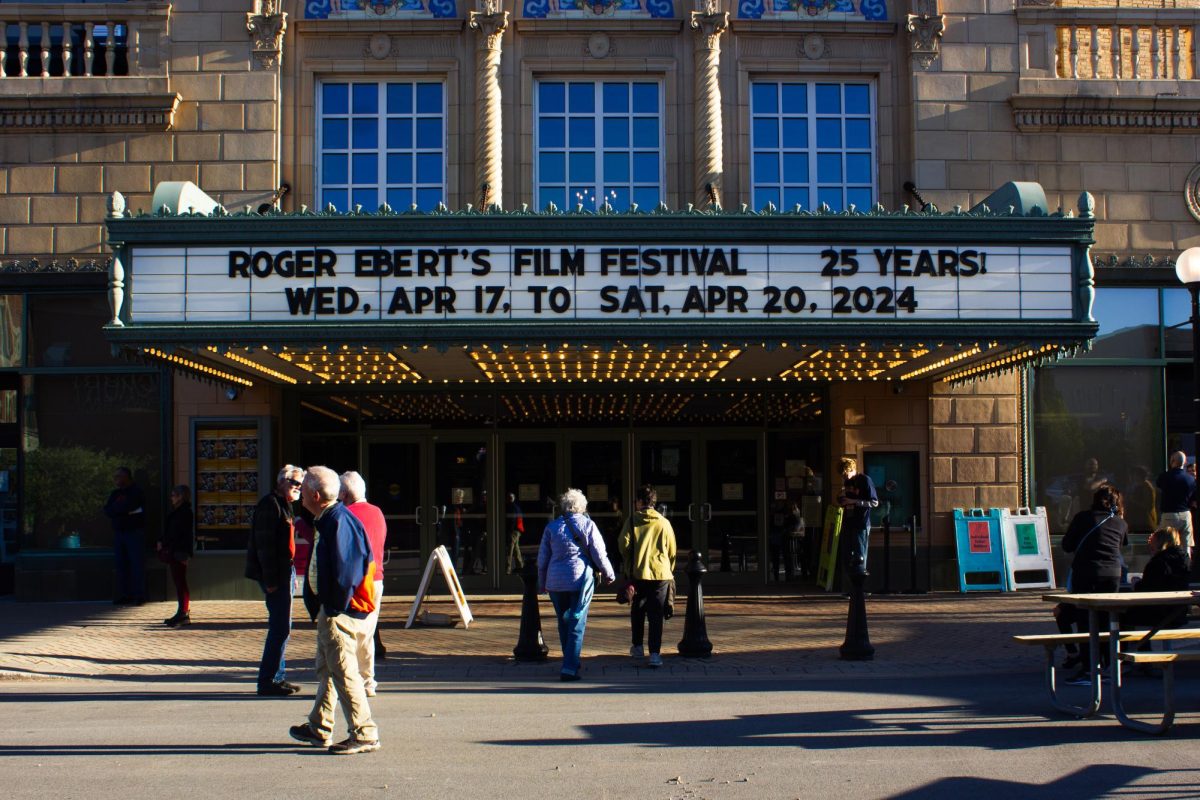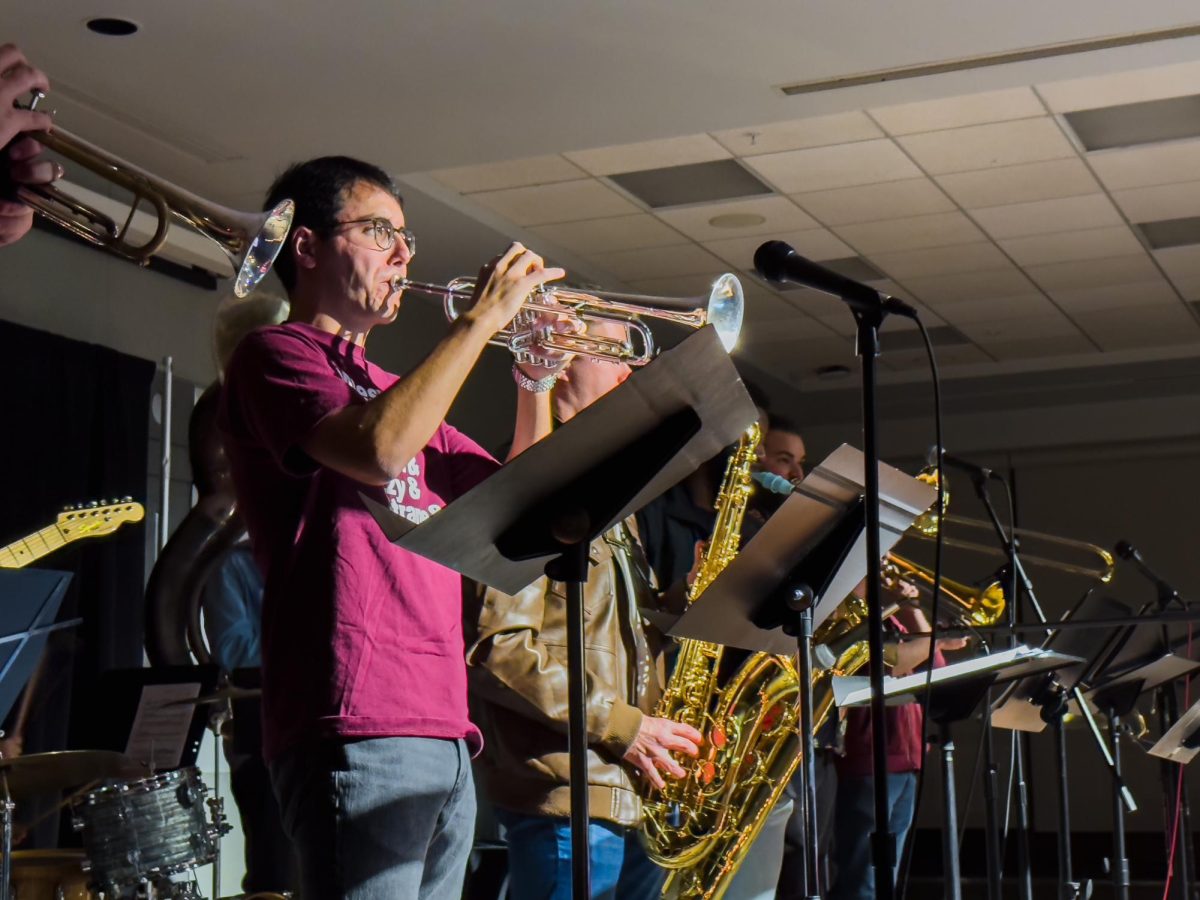The 25th anniversary of Ebertfest continued Thursday night with a screening of Ilker Çatak’s Academy Award-nominated film, “The Teachers’ Lounge.”
The film was presented by Michael Barker, the co-founder and co-president of Sony Pictures Classics. Sony Pictures Classics distributed “The Teachers’ Lounge” internationally.
The event began with an introduction by Chaz Ebert, producer/host of the festival and Roger Ebert’s late wife. Ebert, joined onstage by Barker and University of Georgia film professor Nate Kohn, led the audience in taking a panoramic photo as a kind of souvenir.
“There were a few things we had planned for the 25th because we wanted to make it something special,” Ebert said. The panoramic photo served as a memento both for the screening and for the festival as a whole.
Ebert then introduced Matt Singer, critic for ScreenCrush and author of “Opposable Thumbs: How Siskel and Ebert Changed Movies Forever.”
Get The Daily Illini in your inbox!
Singer discussed how he was motivated to become a film critic by watching the Siskel and Ebert show as a child and wrote the book because of the impact the show had made on him.
“The show meant so much to me that I wanted to (write the book) but was intimidated by (the) monumentalness of the task in my mind,” Singer said.
He was eventually driven to choose Siskel and Ebert as a subject by his wife, who noted how upset he would be should someone else write their story before he did.
Ebert then brought out Michael Barker alongside Kim Robeson and Betsy Hendrick, contributors to the festival. With everyone on stage, Ebert presented a video message from Brand Fortner, scientist and contributor to the festival, who could not make it due to a medical emergency.
“Since co-founding Sony Pictures Classics, Michael has transported hundreds of independent films and dozens of independent projects in the process from idea to film,” Fortner said. “A hundred years from now, people will still be discussing the cinema he helped create. Today’s latest blockbuster? Not so much.”
“I salute you Mr. Barker, and I thank you from the bottom of my heart for your movies, for your vision, and what you have done for our small but stellar festival,” Fortner said. The message was met with a standing ovation from the crowd for Barker.
Robeson then delivered short but heartfelt remarks thanking Barker for his involvement and dedication to the festival.
“I literally don’t know what to say, but I always find something to say,” Barker said, starting his introduction for the film. “Words cannot express what I feel for this festival.”
Barker spoke passionately about filmmaking, Roger Ebert and the way the festival celebrates the movie-going experience at large before displaying his gratitude for the warmth he received earlier.
Shifting towards “The Teachers’ Lounge,” Barker spoke on seeing and acquiring the film at the Berlin International Film Festival. “We had faith that it could reach the audience and that it deserved the attention that it eventually got,” Barker said.
“The Teachers’ Lounge” follows middle school teacher Carla Nowack (Leonie Benesch) after one of her students gets falsely accused of stealing money. Setting up a webcam in the teacher’s lounge, she finds video evidence that Ms. Kuhn (Eve Lobau), the school’s receptionist, may have been responsible for the thefts plaguing the school.
Kuhn is placed on leave and Nowack finds the situation spiraling out of control as Kuhn’s son Oskar (Leonard Stettnisch), also a member of Nowack’s class, seeks answers. As the film progresses, the editing only becomes more and more tense as the very seams of the school start coming undone as the situation boils over.
Çatak, the director of the film, purposely makes it ambiguous whether Kuhn took the money or not. The evidence, if compelling, is circumstantial. Moreover, Çatak understands that the absolute truth of her theft matters far less than the impact it has on Nowak and the institutions within the school on a larger scale.
The film is very anxious, guiding the audience alongside Nowack as she is forced to navigate uncomfortable and inscrutable situations that only seem to dig her deeper and deeper. It works due to Benesch’s incredible lead performance paired with razor-tight editing that continuously ratchets up the tension.
Following the screening was a panel discussion with Ebert, Barker, Singer and Slate film critic Dana Stevens followed by an audience Q&A.
“This is the 20th time I have seen this film and every time it is different,” Barker said on the film’s ambiguity. “It doesn’t end with a nice bow.”
During the audience Q&A, the question of whether or not Kuhn took the money came to the forefront. When Singer asked members of the audience to raise their hands if they thought the mother took the money, most did — to the panelist’s surprise.
“At the beginning, it was made very clear that the women stole the money, no doubt about it, and then it evolved into ‘what are they going to do about it?’” an audience member said during the Q&A session.
“I’m just shocked to hear that there’s any doubt in your mind that the mother took the money,” another audience member said during the Q&A. “I thought one of the points was: She did it, what does the teacher do with that fact?”
The panelists also discussed the film’s stress-inducing atmosphere and the depth of its representation of children.
“In Europe (the critics) say the movie becomes a movie about children’s rights,” Barker said, commenting on the agency the students get as the film progresses as well as on the film’s final shot.
For audience members, the liveliness and depth of discussion in what might be an otherwise unknown film is part of the reason why Ebertfest is so special.
“I think it’s just fun,” said Bert Gilbert, an audience member from Bloomington, Indiana who has been to Ebertfest for 13 years. “It’s a very intellectually stimulating place to be. You can have some really cool conversations with a bunch of other people that nerd out about this stuff.”






